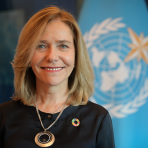Gender Action Day
Third session of the Commission for Weather, Climate, Hydrological, Marine and Related Environmental Services and Applications (SERCOM-3)
4 to 9 March 2024, Bali, Indonesia
It is my honour to welcome you all to the SERCOM Gender Action Day. This will emphasize the crucial role of gender equality and women's empowerment in the work of the WMO community.
I am delighted that this important event takes place on the eve of International Women’s Day on 8th March.
As newly elected Secretary-General of WMO, I give high priority to gender balance, diversity and inclusivity.
I was recently appointed as an International Gender Champion and addressed the launch of the International Gender Champions Climate Impact Group. This is an honor and recognizes that I have in fact been a gender champion throughout my career. Now more than ever, I am committed to gender equality and empowerment.
As we know, the climate crisis is far from “gender neutral”. Women and men are affected differently by weather and climate related hazards and therefore need gender-sensitive information and services.
The statistics show that there is a disparity in deaths between women and men.
For instance:
- Women and girls accounted for 70 per cent of the fatalities after the 2004 Indian Ocean Tsunami in Banda Aceh, Indonesia
- And for 61 per cent of deaths in Myanmar after Cyclone Nargis in 2008,
Fortunately we have made great progress in saving lives – of both men and women. In May 2023, Cyclone Mocha hit Bangladesh and Myanmar, in an area with displaced and refugee populations. It was similar strength to Nargis, which caused more than 138,000 fatalities. With accurate and timely warnings, the death toll associated with Tropical Cyclone Mocha dramatically lower, 145 deaths. And while we acknowledge progress, we recognize this is still 145 lives lost and more remains to be done within our community and with partners to prevent similar losses in the future.
Early Warnings work. We want them to work for everyone.
There are many success stories to guide our path. Our host, BMKG of Indonesia, has improved its early warnings against multiple hazards – including severe weather, earthquakes and tsunamis. These are vital to protect people, especially women and girls, in a nation with more than 6,000 inhabited islands, 300 languages and 1300 ethnic groups.
Gender equality is both a moral and strategic imperative. It underpins sustainable development.
Women play a pivotal role in weather and climate-related sectors, yet they often face systemic barriers to full participation and leadership.
For instance, they have less access to climate information, agricultural advisory services, mobile phone technology and financial credits.
Women are very effective at mobilizing communities in the event of disasters. They are at the frontline of recovery. Women hold knowledge in natural resources and water management. They can be key actors in climate adaptation and mitigation.
By breaking down barriers, we unlock their immense potential to building resilient societies.
This is why many WMO activities within the remit of SERCOM now seek to redress the balance through gender-specific services or training programmes. Examples include:
- aeronautical and agricultural meteorology;
- marine and hydrological services;
- drought and flood management – including the Flash Flood Guidance System.
Gender mainstreaming is an important requirement for donors. For example, some of our CREWs Projects seek to increase access by women and vulnerable communities to hydrometeorological information in LDCs and SIDS. Capacity development programmes likewise factor in gender.
And this special SERCOM Action Day indicates the importance of gender for all our Members.
At WMO, we have made progress in recent years.
- Women’s leadership roles in WMO constituent bodies increased from 31% prior to the reform in 2019 to 39% in 2021.
- Women’s participation in technical commissions subsidiary bodies also rose. In SERCOM and the Research Board, it met or exceeded the minimum target of 40% set by Congress-18.
But we still have much to do.
- The proportion of women experts in INFCOM is low (24%).
- 33% of women delegates attended the Extraordinary Congress in 2021. This was a 6% increase over Congress-18, though still below the target of 40%
- There has been hardly any change in the participation of women in Executive Council sessions
- The proportion of women delegates at the regional association sessions and subsidiary bodies is also lower than our aspirations
- The proportion of women in the Scientific Advisory Panel is unfortunately low at 22%.
Last but not least, let me remind you that we all can be, and must be, gender champions.
How?
Commit and re-commit ourselves to mainstreaming gender equality across all aspects of our work. There are many ways, but let me close my remarks with two important messages:
- Integrate gender considerations into all policies, programs, and activities of the WMO, ensuring that gender equality is a central focus.
- Advocate for increased representation of women in leadership positions within WMO and its constituent bodies, fostering an inclusive and diverse organizational culture.
Thank you for your dedication and partnership in this important endeavour. I wish you a successful Gender Day and Happy International Women’s Day!
Statement by


